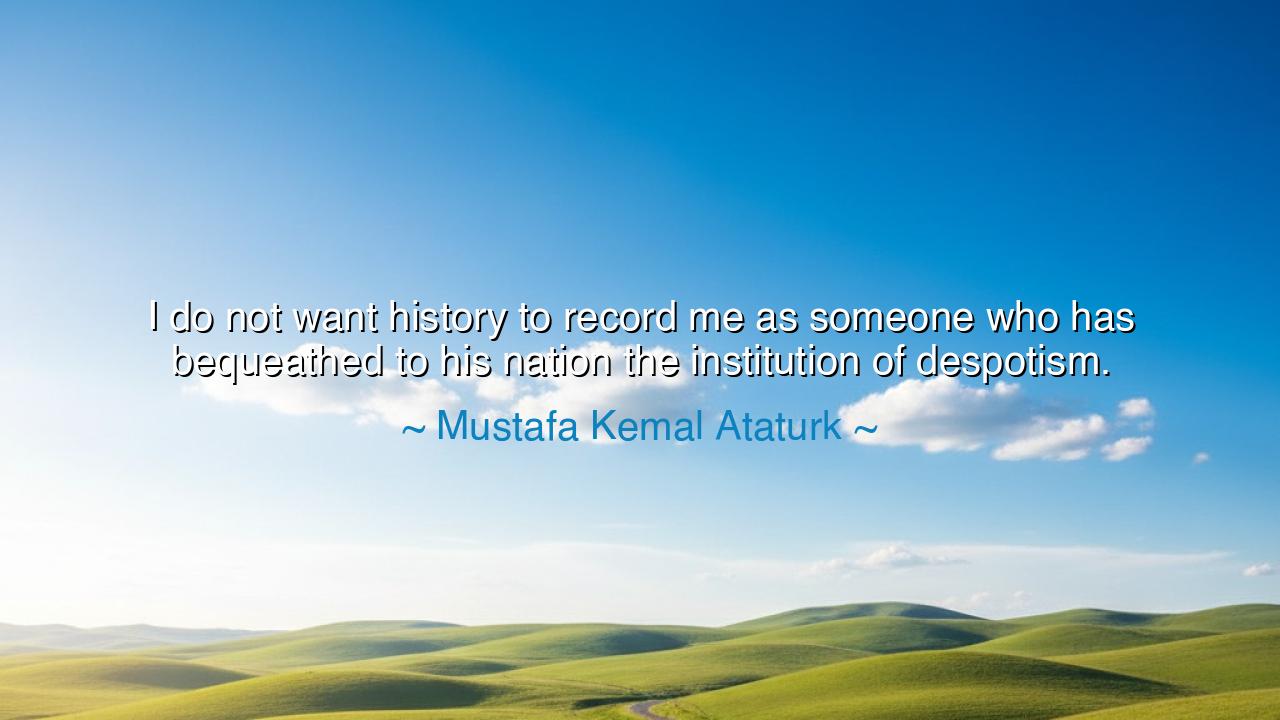
I do not want history to record me as someone who has bequeathed
I do not want history to record me as someone who has bequeathed to his nation the institution of despotism.






“I do not want history to record me as someone who has bequeathed to his nation the institution of despotism.” – Mustafa Kemal Atatürk
In this solemn and powerful declaration, Mustafa Kemal Atatürk, the founder of modern Turkey, reveals the heart of a true statesman — one who seeks not the chains of power, but the liberation of his people. His words are not those of a conqueror seeking glory, but of a guardian of freedom, who understood that the greatest danger to any nation lies not in foreign enemies, but in the slow and silent decay of tyranny. When Atatürk said that he did not wish to be remembered as a man who left behind despotism, he was not merely speaking of political form; he was speaking of spirit — of the sacred duty of leadership to create citizens, not subjects; thinkers, not worshippers of power.
The origin of this quote lies in the turbulent dawn of the 20th century, when Atatürk led the Turkish War of Independence and founded a republic from the ashes of a dying empire. The Ottoman throne, once mighty, had collapsed under its own weight, poisoned by autocracy and stagnation. In its place, Atatürk sought to build a new order — not of sultans and decrees, but of laws and enlightenment, where the voice of the people would replace the will of a single ruler. Yet he knew, as all great reformers do, that power has a subtle poison: even the liberator may become a tyrant if he mistakes himself for the nation. His words, then, were not only a warning to his followers but a vow to himself — that he would not become the very thing he had overthrown.
In this vow resounds a truth that echoes through the corridors of history. Many leaders, born in the fire of revolution, have risen with noble hearts only to be consumed by the very power they wielded. Napoleon Bonaparte, who once proclaimed liberty for France, crowned himself emperor. The same armies that had fought for freedom marched to conquer Europe. What began as revolution became despotism in new robes. Atatürk, who knew the histories of men and nations, understood this fatal temptation. He swore that his revolution — the creation of a secular, democratic republic — would not follow that same tragic path. He sought not worship, but continuity; not obedience, but progress.
When he said, “I do not want history to record me as someone who has bequeathed to his nation the institution of despotism,” Atatürk was shaping not only his legacy but the conscience of a nation. He believed that the strength of a republic lies not in one man’s will, but in the education and participation of its citizens. Thus he built schools, reformed language, advanced women’s rights, and replaced the empire’s blind submission with reason and civic duty. He dreamed of a Turkey where citizens would question, not merely follow — where government would be a living dialogue, not a chain of command. His revolution was not only political but spiritual, for it demanded a transformation of the national mind.
Yet Atatürk’s warning extends beyond his own land and century. His words remind all who lead — and all who follow — that power must serve liberty, not consume it. Every generation faces the danger of despotism, not always through open tyranny, but through the slow erosion of accountability, the complacency of the people, and the cult of personality. When citizens cease to think and merely adore, when leaders cease to serve and begin to rule, despotism takes root once more — even in a land born from revolution. This is the tragedy Atatürk sought to prevent, for he knew that freedom, once surrendered, is seldom regained without blood.
Consider the example of George Washington, the founder of another republic across the ocean. After leading the American colonies to independence, he was offered the crown of a new monarchy — the chance to reign as a king. But Washington refused. He stepped down from power and returned to private life, declaring that the leader’s greatest duty is to ensure that the nation can endure without him. Like Atatürk, Washington understood that true greatness lies not in holding power, but in letting go of it when the time comes. Their legacies endure not because they ruled long, but because they built systems that outlived them.
So, my child of freedom and thought, take this teaching to heart: do not worship power — question it; do not seek dominion — seek service. For leadership without humility becomes tyranny, and obedience without wisdom becomes slavery. Whether you lead a nation, a community, or even yourself, remember Atatürk’s vow: never let history record that you strengthened despotism where liberty might have grown. Build systems that uplift others; educate minds that can think beyond your time.
For in the end, as Atatürk himself taught, the measure of a leader is not how long he rules, but how deeply he plants the seeds of freedom. Let those who come after you inherit not your authority, but your courage — not your power, but your principles. Then, when history writes your name, it will not record a ruler, but a guardian of liberty, whose legacy was not dominion, but enlightenment.






AAdministratorAdministrator
Welcome, honored guests. Please leave a comment, we will respond soon